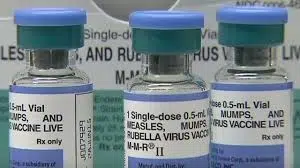
CDC photo
BISMARCK, N.D. (North Dakota Monitor) – North Dakota now has four confirmed measles cases, the Department of Health and Human Services said Monday.
All four cases are in Williams County in northwest North Dakota involving people who were not vaccinated, said Molly Howell, immunization director for the department.
The department announced Friday the first confirmed case, a Williams County child who is believed to have contracted measles from an out-of-state visitor. The three additional cases are people who had contact with the child, Howell said.
The cases are the first reemergence of measles in North Dakota since 2011, Howell said.
A North Dakotan tested positive for measles in 2018, but after additional testing, the department confirmed that person did not have the illness, Howell said.
“Our advice to anyone in North Dakota is to be up to date with your immunizations, especially the MMR (measles, mumps and rubella) vaccine,” Howell said. “Everyone starting at 12 to 15 months of age should receive their first dose of MMR vaccine and the second dose is recommended at 4 to 6 years of age.”
As of May 1, 935 people have contracted measles across the United States, according to the Centers for Disease Control and Prevention. Of those cases, 68% are people age 19 and younger. The federal health organization also said 121 people have been hospitalized and three deaths have resulted from the disease this year.
Howell said infant vaccination rates in North Dakota are at about 81% and school-aged children have about a 90% rate, but those rates differ depending on location. She added there are no immediate plans to roll out mobile vaccination clinics because the vaccines are readily available at local health care providers.
“It’s more concerning in areas where there are lower vaccination rates, so ideally, we’re hoping parents have a conversation with their trusted health care provider,” she said.
With measles being a highly contagious illness, Howell said a 95% vaccination rate is recommended to contain the spread of the disease locally.
Howell said North Dakota public health agencies did lose some COVID-19 pandemic-related funding from the federal government in recent weeks, but she doesn’t believe the cuts will affect the state’s ability to respond to the measles cases.
“We’ll continue to ensure that North Dakotans across the state have access to MMR vaccines, and other vaccines,” she said.
Howell said people should not downplay the seriousness of measles, but she did not want people to panic either.
“What we want is for people to be informed of the benefits of vaccination versus the risks of the disease,” she said. “We used to have 5,000 to 6,000 cases per year before the vaccine was available, but people died and were hospitalized. And now we have a way to prevent it and there’s no reason for anyone to have to deal with this terrible disease.”
Howell said the department will continue to update its measles-dedicated website as more information becomes available.





Comments